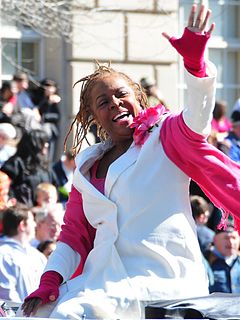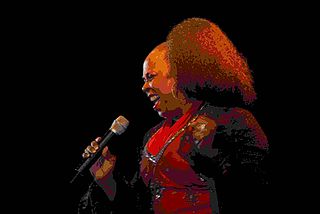
In mathematics, the Euclidean algorithm, or Euclid's algorithm, is an efficient method for computing the greatest common divisor (GCD) of two integers (numbers), the largest number that divides them both without a remainder. It is named after the ancient Greek mathematician Euclid, who first described it in his Elements . It is an example of an algorithm, a step-by-step procedure for performing a calculation according to well-defined rules, and is one of the oldest algorithms in common use. It can be used to reduce fractions to their simplest form, and is a part of many other number-theoretic and cryptographic calculations.
Rhythm and blues, frequently abbreviated as R&B or R'n'B, is a genre of popular music that originated in African-American communities in the 1940s. The term was originally used by record companies to describe recordings marketed predominantly to urban African Americans, at a time when "urbane, rocking, jazz based music ... [with a] heavy, insistent beat" was becoming more popular. In the commercial rhythm and blues music typical of the 1950s through the 1970s, the bands usually consisted of piano, one or two guitars, bass, drums, one or more saxophones, and sometimes background vocalists. R&B lyrical themes often encapsulate the African-American experience of pain and the quest for freedom and joy, as well as triumphs and failures in terms of relationships, economics, and aspirations.

One Nation Under a Groove is the tenth studio album by American funk rock band Funkadelic, released on September 22, 1978 on Warner Bros. Records. Recording sessions took place at United Sound Studio in Detroit, Michigan, with one song recorded live on April 15, 1978 at the Monroe Civic Center in Monroe, Louisiana. The album was the first album to include keyboardist and frequent songwriter Walter "Junie" Morrison.

The O'Jays are an American R&B group from Canton, Ohio, formed in 1958 and originally consisting of Eddie Levert, Walter Lee Williams, William Powell, Bobby Massey, and Bill Isles. The O'Jays made their first chart appearance with the minor hit "Lonely Drifter" in 1963, but reached their greatest level of success once Gamble & Huff, a team of producers and songwriters, signed them to their Philadelphia International label in 1972. With Gamble & Huff, the O'Jays emerged at the forefront of Philadelphia soul with "Back Stabbers" (1972), and topped the US Billboard Hot 100 the following year with "Love Train". Several other US R&B hits followed, and the O'Jays were inducted into the Vocal Group Hall of Fame in 2004, The Rock and Roll Hall of Fame in 2005, and the Rhythm and Blues Music Hall of Fame in 2013.

Thelma Houston is an American singer. Beginning her recording career in the late 1960s, Houston scored a number-one hit record in 1977 with her recording of "Don't Leave Me This Way", which won the Grammy for Best Female R&B Vocal Performance.
Cameo is an American funk band that formed in 1974. Cameo was initially a 14-member group known as the New York City Players; this name was later changed to Cameo.

"Back in My Arms Again" is a 1965 song recorded by The Supremes for the Motown label.

Bessie Regina Norris, better known by her stage name Betty Wright, was an American soul and R&B singer, songwriter and background vocalist. Beginning her professional career in the late 1960s as a teenager, Wright rose to fame in the 1970s with hits such as "Clean Up Woman" and "Tonight Is the Night". Wright was also prominent in her use of whistle register.

"You're All I Need to Get By" is a song recorded by the American R&B/soul duo Marvin Gaye and Tammi Terrell and released on Motown Records' Tamla label in 1968. It was the basis for the 1995 single "I'll Be There for You/You're All I Need to Get By" from Method Man and Mary J. Blige.

"Three Times a Lady" is a 1978 song by American soul group the Commodores for their album Natural High, written by lead singer Lionel Richie. It was produced by James Anthony Carmichael and the Commodores.

Beatrice Melba Hill or Beatrice Melba Smith, known by her stage name Melba Moore, is an American singer and actress.

"Last Dance" is a song by American singer Donna Summer from the soundtrack album to the 1978 film Thank God It's Friday. It was written by Paul Jabara, co-produced by Summer's regular collaborator Giorgio Moroder and Bob Esty, and mixed by Grammy Award-winning producer Stephen Short, whose backing vocals are featured in the song.

"Too Much, Too Little, Too Late" is a song performed by singers Johnny Mathis and Deniece Williams. Lyrics and music were arranged by Nat Kipner and John Vallins. The single was a comeback of sorts for Mathis as his last U.S. top 10 hit was 1964's "What Will Mary Say" and his last U.S. #1 hit was 1957's "Chances Are."
Top R&B/Hip-Hop Albums is a music chart published weekly by Billboard magazine that ranks R&B and hip hop albums based on sales in the United States and is compiled by Nielsen SoundScan. The chart debuted as Hot R&B LPs in the issue dated January 30, 1965@ in an effort by the magazine to further expand into the field of rhythm and blues music. It then went through several name changes, being known as Soul LPs in the 1970s and Top Black Albums in the 1980s, before returning to the R&B identification in 1990 and affixing a hip hop designation in 1999 to reflect the latter's growing sales and relationship to R&B during the decade.
"Tossin' and Turnin'" is a song written by Ritchie Adams and Malou René, and originally recorded by Bobby Lewis in the fall of 1960. The record was released on the Beltone label in December 1960. It reached number one on both the Billboard Hot 100 on July 10, 1961, and R&B chart and has since become a standard on oldies compilations. It was named the number one single on the Billboard chart for 1961, after spending seven consecutive weeks at the top. It was also featured on the soundtrack for the 1978 film Animal House.

"Our Love" is a song by American singer Natalie Cole. Released as a single from her 1977 album Thankful, it spent 2 weeks at number one on the Hot Soul Singles chart in January 1978. It also was a hit on the pop charts, reaching number ten, and has become one of her most familiar songs. It was certified gold in 1978, selling over one million copies.

"The Closer I Get to You" is a romantic ballad performed by singer-songwriter Roberta Flack and soul musician Donny Hathaway. The song was written by James Mtume and Reggie Lucas, two former members of Miles Davis's band, who were members of Flack's band at the time. Produced by Atlantic Records, the song was released on Flack's 1977 album Blue Lights in the Basement, and as a single in 1978. It became a major crossover hit, becoming Flack's biggest commercial hit after her success with her 1973 solo single, "Killing Me Softly with His Song". Originally set as a solo single, Flack's manager, David Franklin, suggested a duet with Hathaway, which resulted in the finished work.
The 1978–79 Divizia C was the 23rd season of Liga III, the third tier of the Romanian football league system.